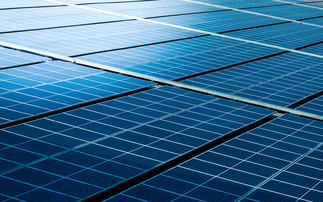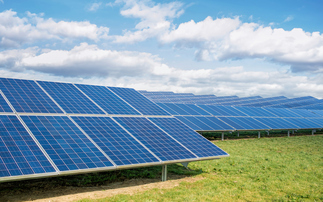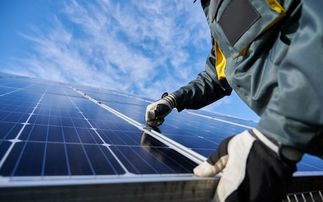Charitable fund-raising drive aims to save babies lives by delivering solar and storage system to the Neonatal Intensive Care Unit in Bo, Sierra Leone
One of the UK's leading clean tech advocates yesterday launched a new charitable campaign to save the lives of babies admitted to the Neonatal Intensive Care Unit at the Government Hospital in the city of Bo, Sierra Leone, where they are currently at risk from frequent blackouts.
Michael Liebreich, founder of Bloomberg New Energy Finance, officially kicked off Project Bo this week with the goal of raising £100,000 to install a 20kW solar and storage system that will provide uninterrupted power supply to the ward.
The campaign was triggered last year by a Tweet from Dr Niall Conroy who was working at the hospital. "Three of our oxygen-dependent babies died last night when the power went off," he wrote. "Not good enough in 2017. Low-cost tech eg affordable solar power must be a priority for saving newborn lives".
The lack of electricity here means that three of our oxygen-dependent babies died last night when the power went off. Not good enough in 2017. Low-cost tech eg affordable solar power must b a priority for saving newborn lives. @UCDMedicine @UCDcems @IrlEmbFreetown @TheEchoOnline pic.twitter.com/8kRyvl4ejF
— Niall Conroy (@NICU_doc_salone) November 20, 2017
Liebreich, who is also Visiting Professor at Imperial College's Energy Futures Lab and member of the high-level steering group of the UN's Sustainable Energy for All initiative, saw the Tweet and pledged to try and bring solar power to the unit.
Speaking to BusinessGreen, he said a team involving the We Care Solar and Energy for Opportunity non-profits had been working on the project for the past two months in order to establish the specifications for the solar and storage system and ensure it can be delivered as quickly as possible.
"We are trying to avoid the classic western donor problem of going in, dumping the unit and going 'job done', but then it doesn't have the right specs, the spare parts, the support of the nurses and doctors," he said. "We have done a lot of work to get the institutional support for it."
Fund-raising activity has also made progress ahead of the official launch, with £29,000 already raised, including the first £18,000 from the Liebreich Foundation, the Rahul Boyle Foundation, Eurelectric, and a private donor.
"The basic equipment and installation will cost about $100,000, but we are raising more as we want to make sure we have enough for maintenance and training," says Liebreich. "And if we end up with more and are in good shape we can make some further improvements. For example, currently mothers don't have a place to wait. There are good things we can do if we go over."
He also stressed the goal was to deliver the project as quickly as possible.
"As soon as we have raised enough money we can order the batteries and once we have £70,000 we can get started on installation," he says. "There is an incredible urgency here. The electricity supply is not reliable and the babies are very vulnerable. They need oxygen and warmth and every time the power goes they are at risk."
His comments were echoed by Richenda Van Leeuwen, former Head of Energy Access at the UN Foundation and a supporter of Project Bo, "No one, anywhere in the world, should lose their life in the 21st century due to a lack of electricity in their health clinic or during a hospital stay, least of all a new-born baby," she said. "Solar PV combined with batteries is the best way to provide the reliable power needed to save lives."
Dr Conroy said the installation would save lives. "The possibility of having 24-hour solar power at the Neonatal Intensive Care Unit is enormously exciting for me and for the truly excellent staff who work there," he said. "It means they will be able to give these babies a real fighting chance, because right now they are dying because of the absence of such simple things as heat and oxygen, which we take for granted in the Western World."
Liebreich said that once delivered the project would also provide a compelling case study to demonstrate how clean technologies can bring reliable clean power to mission critical sites.
"In terms of our industry, the reality is that solar plus storage is a better solution for these types of sites," he said. "If they had a reliable grid there would be no need, but the fact is they have an unreliable grid and will have one for quite a few years. This is an opportunity where you are not just delivering a clean energy project; this is the best way to provide reliable power to this unit. You could do it with diesel and it would cost around $15,000 a year in fuel, and you would also have both noise and air pollution issues, and a theft and reliability issue. It has to go 24x7. Even with petrol you need batteries as it has to be a uninterrupted power supply."
He argued that in contrast "solar and storage is the best solution, and it happens also to be a clean energy project".
"It communicates that we don't have to wait for coal to be pushed off the gird - there are better technologies now," he said. "If you do the economics this is the cheapest way of providing a resilient solution, and it is also silent and clean."
Liebreich also hinted that there was potential for further clean tech innovation to be applied across the medical sector in developing countries.
"None of us know what we are going to do next with this," he admitted. "We are doing the project as quickly as we can and learning from it. And some of us, including myself, will continue to work on these issues. One question is can we start to climb up the energy services ladder? Can we provide more reliable lighting and phototherapy for jaundice? Can the medical equipment be more efficient? Thinking about the energy efficiency of healthcare equipment in the developing world feels like a big issue. It is the difference between having the care and not having the care."
On Monday we'll be launching a campaign to raise £100,000 and build a solar/battery system - because no baby should ever die in Bo Government Hospital's neonatal intensive care unit because of a blackout. Learn more and donate early: https://t.co/4Jv0wxHxM5 pic.twitter.com/mB19adGsBc
— Michael Liebreich (@MLiebreich) February 8, 2018








